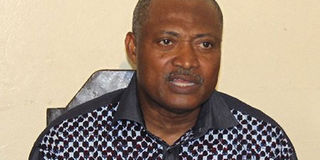Togo opposition to contest poll result

Togo's main opposition candidate Jean-Pierre Fabre (above) also claimed victory despite the electoral commission declaring incumbent President Faure Gnassingbe as the winner. Photo/REUTERS
LOME, Sunday
Togo’s defeated opposition said on Sunday it would contest the election result which returned President Faure Gnassingbe as leader of the West African state.
The election was seen as a test for democracy in a region that in recent weeks has seen a coup in Niger and street riots over delayed elections in Ivory Coast. Togo’s last presidential poll in 2005 sparked violence in which hundreds died.
Gnassingbe -- who took over from his father Gnassingbe Eyadema, who ruled as dictator for 38 years -- won 1.24 million of 2.1 million cast votes in Thursday’s election. His closest rival, Jean-Pierre Fabre, scored around 692,000 votes, the electoral commission said on Saturday. Both sides had claimed victory on Friday.
“We will contest these figures constituency by constituency to show there has been ... an electoral hijack,” Koffi Yamgnane, spokesman for Fabre’s UFC party, told French radio station RFI.
International observers said the poll had gone smoothly, despite some procedural flaws. More than 3,000 local and nearly 500 European and West African observers monitored the election.
The opposition has eight days to convince the constitutional court Gnassingbe’s victory was unlawful. Hours before the result was announced, police fired tear gas to break up a protest by supporters of Fabre. Ten people were arrested in the clash.
“No” to violent protest
The protests that followed Gnassingbe’s first victory in 2005 triggered a security crackdown in which up to 500 were killed, according to UN estimates at the time. The UFC said there would be no violent protest this time. “We have no intention of protesting violently,” party spokesman Yamgnane said.
And on Saturday the streets of Lome were calm and life was returning to normal, residents said. “We’ve opened for business this morning, though we’re keeping a eye on the street,” said market trader Da Mensah in the capital Lome. “We can’t stay at home because of politicians,” he said.
Turnout was just under 65 percent, according to a statement on the Togolese government website. Half the 6.6 million population were registered to vote. “If people have voted then stay calmly at home, the army won’t get involved,” said motorcycle taxi driver Jean Anoumou, who said he had been working all night. “I don’t think there will be violence like there was in 2005.”
Togo is a top five producer of phosphates, which are used in fertilisers, but remains poor and dependent on foreign aid. Togo faced international criticism after the 2005 violence and foreign aid was suspended but a parliamentary election two years later was judged fair enough for aid to be restored and ties made with bodies such as the International Monetary Fund.
Togo is near the bottom of the UN’s human development index and saw several years of negative growth in the past decade. The state budget for 2010 is around 500 CFA francs or $1.09 billion. Togo’s phosphate industry has gone into decline due to a lack of investment, with annual output slipping to around 900,000 tonnes from 1.2 million in 2006.



